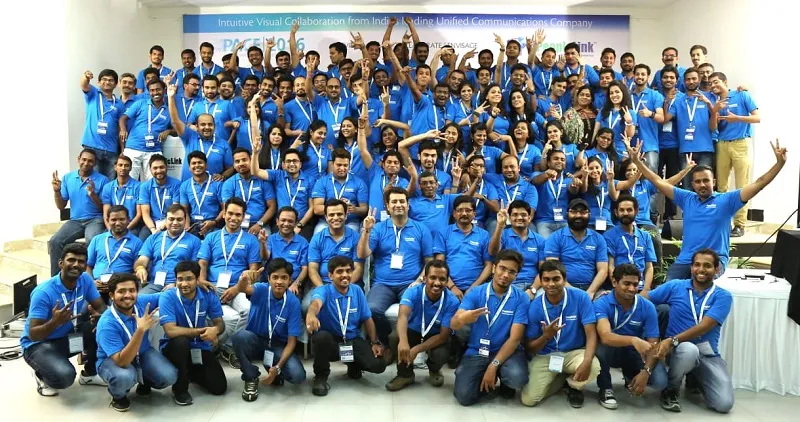How PeopleLink created the strongest Indian alternative to foreign video conferencing and webinar brands
With a 13,000+ customer base across 32 countries, PeopleLink is today the strongest, Indian alternative to foreign video conferencing and Webinar brands. The company recently won the Grand Challenge for Developing Video Conference Solution by MeitY.

PeopleLink founders
Kenyan-Mexican actress and author Lupita Nyang’O once said, “No matter where you’re from, your dreams are valid.”
Dreams have no boundaries but need only creativity, innovation, and passion. The same holds true for Amit Chowdry, the co-founder of Hyderabad-based company , who started his life journey from a small town called Udhampur in the Indian union territory of Jammu and Kashmir, after going through one of the toughest period of his life at an early age.
"I am a Kashmiri Pandit. My family was forcefully displaced from homeland Srinagar (J&K) in early 1990's. I have seen biggest sudden transition in my life where one day my family was well known Chowdry family with many properties within valley and a big joint family living together and overnight the whole family had to migrate to Udhampur to start everything from scratch."
Bootstrapped since it was founded 12 years ago, Amit has today brought PeopleLink at a stage where it is now recognised as one of the leading enterprise communication solution providers globally. As claimed by the founders, the company has been growing at an average CAGR of around 22 percent.
PeopleLink is also the first Indian video conference company to disrupt the market by its approach of offering secure, custom video applications for each industry vertical. The company’s InstaCollaboraton Suite fits into the user work flow, instead of trying to force fit all customers into a standard video conference format. Its unique vMCU pricing enables organisations to save up to 70 percent of cost, compared to the prevalent host-based licensing offered by other products.
With operations in over 32 countries including Middle East, Europe, Africa, over two lakh touch points globally, and a team of over 200 people, the PeopleLink solution is currently being used by clients like Indian Oil, Fortis, Bajaj, NBCC, and RISL, in addition to multiple state government departments including Karnataka, West Bengal, Rajasthan, UP, and Kerala among others.
Popular government initiatives like Ayush Mission by the Uttar Pradesh government, and eSanjeevani — the healthcare platform for COVID-19 which is being currently used by 18 states – have been powered by the PeopleLink video-conferencing application InstaVC.
“More than 1.5 lakh video consultations have been done on the eSanjeevani platform in the last four months. In Rajasthan alone, more than 21,000 gram panchayats are connected through PeopleLink making it the world's largest deployment,” claims Amit.

Team at PeopleLink
Taking inspiration from a shutdown venture
Amit started his career with a US-headquartered software-based video conferencing company FPC Corporation early in 2000 as a Country Head. However, due to the lack of internet and digital infrastructure, the company was shut down within three years. He then joined another company where he got the opportunity to learn how audio features work in a conferencing solution.
Leveraging these learnings, Amit began PeopleLink in 2007. Digital infrastructure in the 2000s, however, was a far cry from what it was now.. The infrastructure in India was in a nascent phase which made starting up a technology product company in India another challenge to deal with.
Not only was the product much ahead of its time, but there was also no ready market, particularly for a software-driven video conferencing platform. The existing top players in the market were Cisco and Polycom, who dominated the market with their hardware solutions.
“I believed it was the right time, even though it was a bit ahead of its time. However, the stage was being set and it was inevitable that software-driven video conferencing would soon come of age. I launched PeopleLink in 2007 along with my wife Damanjeet Kaur as a co-founder – around four years before Zoom was launched,” adds Amit.
Creating product differentiation with a vertical focus
PeopleLink currently offers multipoint and interoperable hardware, software, web conference, cloud and on-premise video conferencing solutions. The company aims to create differentiation by venturing deep into different verticals and build specific applications for each.
At present, the company has 12 video conferencing applications, with the most popular being the healthcare and education solutions. The other popular sector applications include commerce, virtual offices, consultation, digital broadcasting, and law.
The existing video conferencing solutions are one-size-fits-all and offer only one way of communication. On the other hand, PeopleLink’s video conferencing solution integrates a number of vertical-specific features to make it a holistic application,” says Amit.
For instance,
is a healthcare application that allows doctors and patients to connect online, besides also offering inbuilt prescription systems, inbuilt healthcare management system, while also allowing patients to upload their reports, scan documents, send their prescriptions to their mobiles – all on one platform.
The company also gained recognition as a ‘potential product’ for the application ‘InstaVC’ in the recently organised “Grand Challenge for Developing Video Conference Solution” by the Indian government along with the other two companies.
PeopleLink offers both InstaVC – a freemium model with basic features and InstaVC Pro – the advanced version with a commercial stack. However, for the competition, they presented only InstaVC with added security features to align with the government’s Atmanirbhar Bharat mission.
This included features like multiple levels of password protection, separate password for separate individuals, virtual waiting rooms, and a multiple connection link setup, among others.
“We wanted to present the indigenously developed components. So, we chose to only present InstaVC. Although later, we found that solutions with commercial stacks were also offered, which placed other players at an advantage,” says Amit.
Are deep-pocketed players like Zoom, JioMeet a threat?
With video conferencing receiving fresh interest in the wake of the COVID-19 pandemic, international players like Zoom, Microsoft Teams, Skype, and Google Meet have seen an increase in market share. Back home, the Indian government’s Aatmanirbhar Bharat initiative has given impetus to local players.
“Considering the billion dollar market valuations of international brands operational in India, the prize money of Rs 1 crore may not seem enough. However, the branding and credibility we have received with this recognition is incomparable. This will certainly help in strengthening and levelling the field for local players like us,” says Amit.
When asked about the impact of increasing popularity of local players like Say Namaste, KL Meet, Airmeet and the recently launched JioMeet, Amit seems optimistic. According to him, PeopleLink has always been competitive on the pricing front. Also, the team has the capability to keep tabs on the market and introduce solutions that are needed for the hour, with the potential to take them to the next level.
“Since we started in 2007, we have seen many companies in this industry starting up and closing down. Regardless of whether the venture is bootstrapped or funded, what matters the most, is the experience offered to the user and the market knowhow,” he adds.

Product stack offered by PeopleLink
The road to aatmanirbhar for PeopleLink
With the video conferencing market estimated to grow to $11.56 billion by the end of 2027, PeopleLink is working on expanding its global presence, adding B2C features and introducing new solutions for the remote working space.
Their beta version has already been launched across their network of 13,000 partners, and a patent has already been filed for the commercial version, which is scheduled for launch in January 2021.
Amit believes that the solution has the potential to be a massive game-changer for the space. The patent that they have filed is for creating an entire ecosystem that integrates all office workflow and communication applications, making it easier for everyone to digitise their organisation and thereby giving PeopleLink the potential to disrupt the flexi-workspace market.
“The market is now 120x bigger and it requires a lot more energy, strategy and funds to leverage this opportunity further,” he says, signing off.
(Edited by Ryan Frantz)










